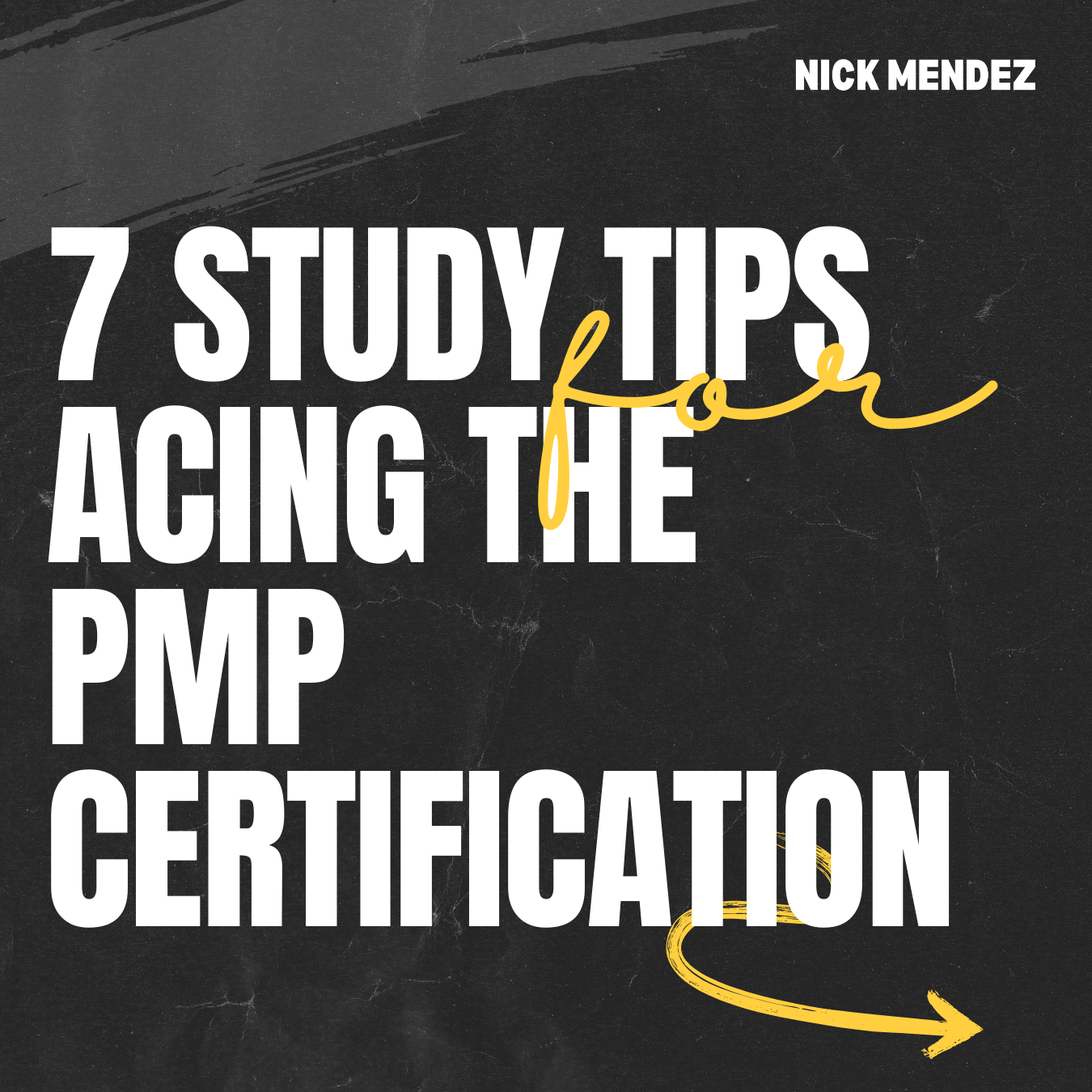7 Study Tips for Acing the PMP Certification – Guide to Success
Table of Contents

About the Author – About Nicholas Mendez (Nick Mendez):
Nicholas Mendez (Nick Mendez) is a 25-year-old tech professional with 5+ years of project management experience. He earned his PMP certification on April 30, 2023, marking a significant milestone in his career. Since then, he’s written many guest posts and blog posts where readers have received a great amount of value and knowledge to prepare for their PMP exam. Check out his FREE exclusive top-notch PMP study resources at teachmeit.co and nickmendez.co and get ready to take your career to the next level!

Ready to elevate your project management career and earn the prestigious Project Management Professional (PMP) certification? This globally recognized credential, awarded by the Project Management Institute (PMI), signifies mastery in project management principles and practices across industries.
Achieving the PMP certification success requires more than just basic memorization—it demands strategic study techniques. We will explore seven tried-and-true study techniques in this post to help you pass the PMP exam. From understanding the exam structure to managing stress effectively, these tips will guide you towards acing your PMP certification on your first attempt.
1) Understand the Exam Structure to Succeed
Familiarity with the exam structure is essential for effective preparation. It allows you to tailor your study plan to focus on the areas that are most relevant to the exam format. By understanding how questions are presented and what is expected in your responses, you can prioritize your study efforts accordingly.
The PMP certification exam is structured to evaluate your understanding of project management principles, practices, and methodologies. The exam itself consists of multiple-choice questions that assess your knowledge across various areas, including:
- Initiating
- Planning
- Executing
- Monitoring and controlling
- Closing projects
Each question presents a scenario or problem related to project management, and you must select the most appropriate response from the provided options. Practice exams are also perfect for understanding the way the exam will be presented.
2) Utilize Official Study Materials
The Project Management Body of Knowledge (PMBOK) Guide is a comprehensive resource published by the Project Management Institute (PMI). It serves as a foundational reference for project management professionals and is a key resource for PMP exam preparation. The PMBOK Guide outlines standard project management practices, processes, and terminology, providing a framework that candidates can use to deepen their understanding of project management principles. The PMP Exam Content Outline also offers a thorough summary of the subjects tested on the exam, advising candidates on what to concentrate on and study for the test. Together, these official resources offer invaluable guidance and support for PMP aspirants as they navigate their certification journey.
For the purpose of preparing for the PMP exam, using official study materials like the PMBOK Guide and the PMP Exam Content Outline has several benefits. Some of these benefits include:
- Developed by PMI for PMP exam
- Ensures alignment with exam content
- Provides relevant and up-to-date information
- Builds a solid knowledge foundation
By using official resources, PMP candidates can approach their preparation with confidence, knowing that they are equipped with the most reliable and authoritative study materials available. The PMBOK is the most useful resource as this is the material where PMP questions are pulled from.
3) Create a Study Plan
Creating a structured study plan is paramount for effective PMP exam preparation. Without a clear roadmap outlining what topics to cover and when, candidates may find themselves overwhelmed and unsure of where to focus their efforts. A well-structured study plan also enables applicants to monitor their development, pinpoint their areas of strength and weakness, and modify their study strategy accordingly. By investing time in developing a comprehensive study plan upfront, candidates set themselves up for success and increase their chances of passing the PMP exam on their first attempt.
Tips for Organizing Study Time Effectively:
When organizing study time, it’s essential to strike a balance between consistency and flexibility. Here are some tips for creating an effective study plan:
- Set realistic goals: Break down the material into manageable chunks and set specific, achievable goals for each study session.
- Allocate dedicated study time: Schedule regular study sessions in your calendar and treat them as non-negotiable appointments.
- Prioritize topics: Identify high-priority topics based on their weighting in the exam and allocate more study time to areas where you need the most improvement.
- Mix up study methods: Incorporate a variety of study methods, such as reading, watching videos, practicing with sample questions, and participating in study groups, to keep your study sessions engaging and effective.
- Take breaks: Factor in short breaks during your study sessions to rest and recharge, helping to maintain focus and productivity.
- Review and revise: Schedule regular review sessions to reinforce your understanding of key concepts and ensure retention of information.
- Stay adaptable: Be prepared to adjust your study plan as needed based on your progress and evolving study needs.
By following these tips and developing a structured study plan tailored to your individual learning style and schedule, you’ll be better equipped to maximize your study time and achieve success on the PMP exam.
4) Practice with Sample Questions
Engaging in practice with sample questions is an indispensable component of effective PMP exam preparation. There are several key benefits to incorporating sample questions into your study routine. Here are some other points to consider:
- Practice with sample questions familiarizes you with the exam format, reducing test-taking anxiety and boosting confidence.
- Sample questions help you evaluate your grasp of important ideas and point out areas that require more research.
- Solving practice questions strengthens understanding and enhances problem-solving abilities.
- Exposure to different question types and difficulty levels prepares you for any question on the exam.
- Access sample exams and quizzes from reputable study guides, review courses, and online platforms.
- The PMI offers official practice exams and sample questions on its website.
- Choose practice resources aligned with the PMBOK Guide and PMP Exam Content Outline for relevance and accuracy.
| What to Expect Here are a few examples of questions you can plan to see on the PMP certification exam: Which of the following is NOT a component of the Project Management Plan? a) Scope Management Plan b) Quality Management Plan c) Risk Management Plan d) Stakeholder Management Plan During which phase of the project life cycle are project objectives defined and documented? a) Initiating b) Planning c) Executing d) Monitoring and Controlling Which document outlines the project’s scope, objectives, and deliverables, and is used as a reference throughout the project execution? a) Project Charter b) Scope Statement c) Work Breakdown Structure (WBS) d) Project Management Plan During which project management process group are project activities and resources monitored, and adjustments made as necessary to achieve project objectives? a) Initiating b) Planning c) Executing d) Monitoring and Controlling Which of the following is a tool or technique used in the Define Activities process? a) Expert Judgment b) Decomposition c) Pareto Analysis d) Earned Value Management (EVM) **Please note that these questions are for illustrative purposes only and may not reflect the exact format or content of the PMP certification exam. Answers: d) Stakeholder Management Plan b) Planning a) Project Charter d) Monitoring and Controlling b) Decomposition |
You can effectively supplement your study efforts and boost your confidence as you get ready for the PMP certification exam by using a variety of sample exams and quizzes from reliable sources. Using quick quizzes and flashcards to test yourself is also a great way to retain material.
5) Join or Create a Study Group
Studying in a group setting offers numerous advantages for PMP exam preparation. Collaborative learning is a key benefit, as group discussions facilitate the exchange of insights, perspectives, and knowledge among members, helping to deepen understanding and clarify concepts. Being a part of a study group also promotes accountability because its members help and motivate one another to remain dedicated to their studies. This shared accountability helps maintain motivation and morale, as members share their progress, challenges, and successes, fostering a sense of camaraderie and shared accomplishment.
Leveraging virtual meeting platforms like Zoom or Skype can facilitate study group sessions, especially if members are located in different geographic areas. Rotating leadership roles within the group ensures equal participation and contribution from all members. The study group’s chances of success on the PMP certification exam can ultimately be increased by maintaining a commitment to regular communication and participation while remaining understanding of members’ schedules and obligations.
6) Focus on Your Weak Areas
Identifying and addressing weak areas in PMP exam preparation is crucial for success. When you know what you’re not so good at, you can focus your study time where it matters most. Once you figure out your weak spots through practice exams or identifying them yourself, you can use different strategies to improve, like going back to basics, trying new study methods, practicing a lot, and getting help from mentors or study groups. By putting in consistent effort and tackling tough topics head-on, you’ll boost your understanding and confidence for the PMP certification exam.
Consistency and a proactive approach to tackling weak areas are key to mastering challenging topics in PMP exam prep. Keep practicing regularly, reviewing your notes, asking questions when you’re stuck, and breaking down tricky concepts into smaller, easier-to-understand parts. With dedication and persistence, you’ll build your skills and be well-prepared to ace the PMP exam.
7) Stay Consistent and Manage Stress
Maintaining a consistent study routine is vital for PMP exam success. By establishing a regular schedule and sticking to it, candidates can stay organized and focused on their preparation. Setting specific study goals and breaking down the material into manageable parts can make studying more manageable. Finding a conducive study environment and minimizing distractions are also crucial for maintaining concentration and productivity.
Managing exam-related stress is essential for maintaining peak performance during PMP exam preparation. Techniques like deep breathing exercises, meditation, and mindfulness practices can help reduce stress and promote relaxation. Setting realistic expectations and maintaining a positive mindset can alleviate anxiety and boost confidence. Prioritizing physical health through regular exercise, balanced nutrition, and adequate sleep enhances overall resilience. Seeking emotional support from friends, family, or mentors can provide reassurance and encouragement during challenging times. By implementing these strategies, candidates can effectively manage stress, prevent burnout, and maintain consistency in their PMP exam preparation journey.
Conclusion – Your PMP Certification is on the Way!
In conclusion, mastering the PMP certification demands a strategic study approach, and the outlined seven study strategies offer a solid foundation for success. Understanding the exam structure, utilizing official study materials, and creating a structured study plan are essential steps. With dedication and perseverance, you’ll be well-equipped to conquer the PMP exam and achieve your goal of becoming a certified Project Management Professional. Best of luck on your journey!
Looking for top 10 project management software options? Check out this link to explore more.
Further Reading
PMI PMBOK Guide. Retrieved from https://www.pmi.org/pmbok-guide-standards/foundational/pmbok
PMI Official Website. Retrieved from https://www.pmi.org/
PMI. (n.d.). PMP Examination Content Outline (PDF). Retrieved from https://www.pmi.org/-/media/pmi/documents/public/pdf/certifications/pmp-examination-content-outline.pdf
PMI. (n.d.). Proactive Intervention in Project Problems. Retrieved from https://www.pmi.org/learning/library/proactive-intervention-resolving-project-problems-137
